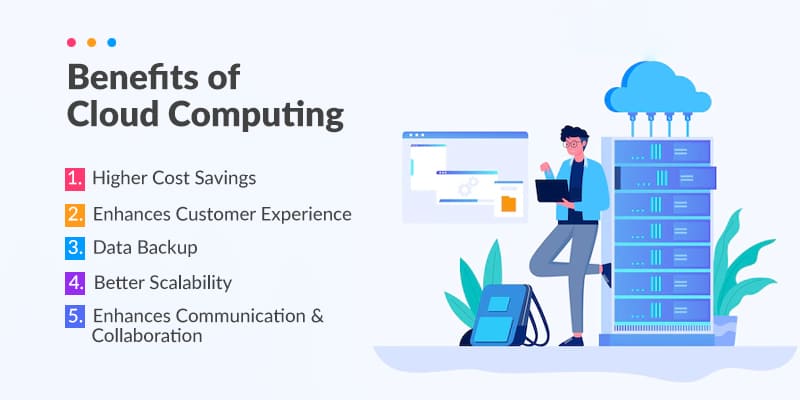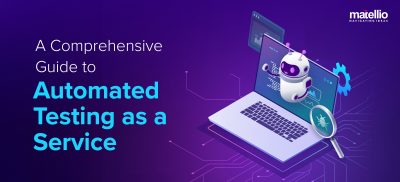
Cloud computing is transforming many industries’ operations today, and because of its flexibility, capacity, and ease of data access, cloud computing has been increasingly popular among businesses in recent years.
Massive volumes of sensitive data of businesses are now housed in the cloud, and with security breaches on the rise, the disadvantages of conventional computing operations have surpassed the benefits of cloud computing for businesses. However, as a key solution, blockchain technology has enormous promise to deliver a system that is inexpensive, scalable, and secure.
The implementation of blockchain technology in cloud computing is being regarded as a game-changer for future activities such as data processing, financial transactions, transparency, and secured connected networks to exchange information, among others.
In this blog, we’ll talk about some of the uses of blockchain technology in cloud computing and their possible integration advantages.
What is Blockchain Technology?
Blockchain, a Distributed Ledger Technology (DLT), is a technology that aids in the recording of data. The data is securely stored in such a way that anyone attempting to manipulate or exploit the system will have a tough time doing so. The technology ensures that the system is visible and immutable.
According to Business Insider, global investment in blockchain technology is expected to reach about $17.9 billion in 2024, with a CAGR of 46.4 percent over the next five years.
But,
Why is Blockchain Technology so Important for Businesses?
Nearly every day, a massive amount of data is generated as a result of digitization, necessitating comprehensive security threat management and significant cost savings for every organization. Decentralized ownership, immutability, and cryptographic data security are all promises made by blockchain technology.
Blockchain technology is certainly gaining traction. According to Gartner, by 2030, blockchain will produce 3.1 trillion dollars in business value.
The importance of blockchain in terms of security cannot be overstated. At the end of the chain, fresh blocks (with new information) are indeed added. Each addition will have its digital signature, also known as a hash, a string of numbers and letters.
To be successful, cybercriminals would have to update all the information up and down the blockchain accurately, which isn’t easy.
This technology also eliminates the middlemen, allowing businesses to save money while increasing profits. Blockchain technology enables businesses to confirm and conduct secure transactions in a more direct manner.
Here are some of the benefits of using blockchain technology,

Higher Transparency
Information on blockchains may be viewed by anybody and cannot be changed. As a result, risk and fraud will be reduced, while credibility will be built.
No Middleman
Blockchain is a peer-to-peer network that will eliminate the need for some third-party intermediaries. This improves the efficiency of processes and reduces the chances of data entering errors and transaction fees.
Highly Efficient
In terms of efficiency and speed, blockchain is unsurpassed in the market. This is due to the technology’s purpose of automating all time-consuming operations and increasing your company’s output. This form of effective and quick automation also eliminates the possibility of human error. The digital ledger of blockchain allows you to save everything in one place. This streamlines your automated procedures even further, making easy data accessibility than ever before.
Efficient Security
Because blockchain is distributed and protected, it will be impossible to hack. This has the potential to improve business operations.
Greater ROI
Distributed ledgers will help businesses build leaner, more efficient, and profitable operations, resulting in a quick return on investment.
What is Cloud Computing?
Cloud computing means delivering computer services such as hosting, storage, networking, and data processing via an internet-based cloud rather than a personal server. Cloud computing offers a range of services in reducing their processing load. There are numerous benefits, including lower hardware and maintenance costs, global availability, adaptability with a fully automated procedure, and high scalability.
Data protection, recovery procedures, email, virtual desktops, software development and testing, big data analytics, and customer-facing web apps are just a few use cases that organizations of all sizes and industries are using cloud computing.
As per research by Marketsandmarkets, by 2022, the cloud storage industry is expected to reach $89 billion, up from $31 billion in 2017.
Read More: IoT and Blockchain in Supply Chain and Logistics
Many companies like Apple, Pinterest, Netflix, eBay, and many others are gaining the benefits of cloud computing.

Businesses can gain immense benefits by leveraging cloud computing. Here are a few of the many benefits of cloud computing for businesses are: –
Higher Cost Savings
Reduced expenses are one of the most significant advantages of cloud computing. Because businesses don’t have to create their own IT infrastructure or buy gear or equipment, they can save a lot of money on capital expenses.
Enhances Customer Experience
Cloud-based solutions can indeed help businesses improve their customer service standards. Today, the customer experience is critical, and customers have learned to expect businesses to pay considerably greater attention to their requirements. Businesses that succeed in this will have a significantly higher chance of establishing long-term client relationships.
Data Backup
Businesses of all sizes are vulnerable to data loss and disruption. To guarantee greater application performance and business continuity, major cloud computing providers are well-prepared to endure unexpected interruptions, including hardware/software failure, natural catastrophes, and power outages.
Better Scalability
Cloud computing gives organizations of all sizes more freedom. They can indeed easily scale up or down computing resources depending on their demands and budget, whether they need more bandwidth, processing power, or storage space.
Enhances Communication & Collaboration
Cloud applications enable businesses to collaborate more easily and securely by allowing them to interact in real-time and securely access and share information. Cloud computing allows numerous people to concurrently edit documents or work on data in a fairway.
Why is Integrating Blockchain Technology with Cloud Computing Important?
The fundamental challenges of security and privacy are overcome when cloud computing and blockchain technology are integrated. By providing a decentralized and distributed architecture, blockchain also helps to improve transparency.
Well, there are many reasons behind the importance of integrating blockchain technology with cloud computing. Here are a few of them.
When it comes to storing information, cloud computing uses a centralized architecture, which might lead to data tampering. Blockchain is a distributed ledger technology that makes data manipulation more difficult while also assisting in the creation of reliable auditing.
As cloud computing is centered on the client-server concept, if one system fails, the entire process of transmitting data is halted until the system recovers. However, if blockchain is combined with the cloud, this issue can be solved. The transaction that takes place on a distributed network and the loss of a node or a system has no effect on the transitional stage.
The architecture of cloud computing ensures data security, but when information transfers from one location to another, security vulnerabilities frequently develop. By dividing data into little parts and adding an extra layer of protection before distributing it, blockchain technology ensures point-to-point encryption.
Read More: Everything to Know About Cloud Computing in eCommerce
Blockchain technology has a significant impact on data storage, transactions, and business processes. Consequently, combining blockchain technology and the cloud improves security, decentralization, authorization, privacy, and efficiency while also increasing security and decentralization.
Blockchain technology and cloud computing have the potential. Technology integration can be used not just by startups but also by established organizations, and it can be successfully adopted in government agencies to help with the day-to-day tasks of maintaining vast amounts of data.
Benefits of Blockchain Technology in Cloud Computing
Many businesses have found blockchain technology with cloud computing to be advantageous, so let’s take a closer look at the advantages of combining cloud computing and blockchain technology.

Enables Easy Ownership Tracking
When cloud computing and blockchain are joined, it opens up possibilities for efficiently managing valuable assets such as stock ownership, legal papers, and real estate titles. The archiving procedure of clearance for transactions enhances the system continuously within microseconds when one switches to cloud computing technologies.
Prevents Data Tampering
One of the most significant concerns when storing data on the cloud is ensuring that the original data has not been tampered with. Blockchain’s empirical architecture provides a secure way to track capacity and reinforcement history while ensuring that the original data/information has not been tampered with. Rather than keeping content, blockchain saves just the scrambled hashes of linked data, allowing the originality of the data to be verified.
Enhances Network Resilience
A natural calamity or tragedy is less likely to disrupt services when the cloud computing network has enough cloud storage in numerous places or continents. The processing load is subsequently transferred to another system network node that is fully operational.
By concept, blockchain technology is a distributed data system. When paired with a cloud computing platform, it becomes a useful tool for increasing network resilience by broadening its diverse geographical range.
Lower Costs
The nature of blockchain technology can also help businesses save money. It also enhances transaction processing efficiency. It also optimizes reporting and auditing operations by lowering manual duties like data aggregation and amendment. Financial institutions can save money when they use blockchain technology in their cloud solutions, according to professionals, since blockchain’s capacity to speed clearing and settlement converts immediately into process cost savings. In general, blockchain technology helps organizations save money by removing the middlemen vendors and third-party providers who have traditionally handled the work that blockchain can take.
Enables Permanent Audit Trails
The records gathered can be transmitted in the cloud and retained by organizations for audit verification when combined with cloud computing. Blockchain technology creates a permanent record of transactions. Another fascinating blockchain technology in cloud computing breakthrough is the ‘proof of history’ ability, which operates similarly to the delete function but is provable. This operation also creates a time record for the cloud computing network. The proof of history characteristic sets a permanent timestamp on the transaction date, whereas blockchain technology gives an audit record of the transaction in the present order.
Transparency
As blockchain technology provides complete transparency, any ambiguous activity within a company will be revealed. Furthermore, its sequential accumulation ensures that every transaction may be examined at any time. Blockchain-based cloud computing works with permanent transaction records to validate ownership and identity by forming a strong, coordinated, and connected network of blocks.
Improves Speed
Cloud computing must always be aware of process improvement. And among the most functional systems is the blockchain system. Furthermore, because blockchain is a decentralized technology, it can aid cloud computing architecture development. This means that the computers and devices can do certain storage or data processing activities at the same time. As a result, any reliable operation’s overall time will be reduced, and the processing speed will be improved.
Scalability
Blockchain technology can manage a large number of transactions. As a result, it’s also ideal for large-scale technology. Consequently, in order to stay competitive, you’ll require reliable data processing services. The enormous volume of transactions required by blockchain development services will necessitate a resilient architecture. In this case, cloud computing can provide on-demand cloud services for increased scalability.
How Matellio can Help Your Business with Blockchain Technology?
Cloud computing and blockchain technology get along seamlessly. It accommodates edge computing requirements, large-scale improvement procedures, and decentralized data storage in order to emerge efficiently.
With its interconnected blocks, hashing mechanisms, and decentralized design, blockchain-based cloud computing optimally combines security and scalability. As a result, integration is an excellent way of providing an additional layer of protection to cloud storage. Businesses can decrease IT costs, improve security, and streamline information flow by strategically adopting blockchain technology in cloud computing.
Blockchain technology is transforming industries such as healthcare, education, finance, commerce, and more for the good. Hire Matellio today if you’re establishing or running a company and need a low-cost, dependable, developer-friendly cloud solution. Our blockchain development services can help you expand your company/business.




